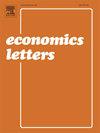公共物品博弈中点对点(反)惩罚背后的动机:一项实验
IF 1.8
4区 经济学
Q2 ECONOMICS
引用次数: 0
摘要
众所周知,在有可能实施反惩罚的情况下,在采用点对点惩罚的公共产品博弈中,效率往往无法提高。本文首次通过实验证明,无论决策形式(个人还是团队)如何,制裁机构的影响都是适度的。在“团队”条件下,受试者被随机分配为三人一组,通过沟通共同决策。他们的对话对(反)惩罚背后的动机以及由此产生的行为影响提供了有价值的见解。一项编码练习表明,一阶惩罚(和反惩罚)主要是对同伴低贡献(分别是一阶惩罚)的情绪反应。本文章由计算机程序翻译,如有差异,请以英文原文为准。
Motivations behind peer-to-peer (Counter-)punishment in public goods games: An experiment
It is well-known that efficiency often fails to improve in public goods games with peer-to-peer punishment when counter-punishment is possible. This paper experimentally demonstrates, for the first time, that the effects of sanctioning institutions are modest, regardless of the decision-making format (individual or team). In the “team” conditions, subjects are randomly assigned to teams of three, and make joint decisions through communication. Their dialogue provides valuable insights into the motivations behind (counter-)punishment, as well as the resulting behavioral effects. A coding exercise reveals that first-order punishments (and counter-punishments) are primarily emotional responses to peers’ low contributions (and first-order punishments, respectively).
求助全文
通过发布文献求助,成功后即可免费获取论文全文。
去求助
来源期刊

Economics Letters
ECONOMICS-
CiteScore
3.20
自引率
5.00%
发文量
348
审稿时长
30 days
期刊介绍:
Many economists today are concerned by the proliferation of journals and the concomitant labyrinth of research to be conquered in order to reach the specific information they require. To combat this tendency, Economics Letters has been conceived and designed outside the realm of the traditional economics journal. As a Letters Journal, it consists of concise communications (letters) that provide a means of rapid and efficient dissemination of new results, models and methods in all fields of economic research.
 求助内容:
求助内容: 应助结果提醒方式:
应助结果提醒方式:


